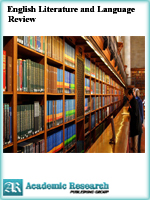English Literature and Language Review
Online ISSN: 2412-1703
Print ISSN: 2413-8827
Print ISSN: 2413-8827
Quarterly Published (4 Issues Per Year)

Archives
Volume 2 Number 4 April 2016
Identification of the Teacher?s Debilitating Attitude Involved in Acquiring Oral Competency of ESL Students at Graduate Level
Authors: Sadia Ayub ; Muhammad Arfan Lodhi
Pages: 43-48
Abstract
The purpose of this study was to identify the factors related to the teacher’s attitude involved in oral communication of ESL students. The investigation was carried out at Bahawalpur, Pakistan. This research was reported on a survey study and used a questionnaire for the students and interview format for the teachers as tools to investigate the issue. The interview was taken from forty highly experienced ESL/EFL teachers; and for questionnaire almost 100 students from each college were selected, total 498 ESL students participated in this research. The data provided through interview from teacher was analyzed qualitatively and the data from the students was analyzed through SPSS and Microsoft Excel. The following conclusion was drawn from the data collected from this investigation: Instructor’s attitude motivates debilitating speaking factors. This investigation has proved explanatory implications and additionally this study also examined the attitudes and opinions of language teachers about second language learning and teaching. Furthermore, the research suggested a variety of strategies for learners to cope with second language anxiety.
Issues of Language Diversity for Today?s Refugees
Authors: Judith A. Cochran
Pages: 36-42
Abstract
A mass migration of refugees is threatening the economic and social stability of Lebanon, Jordan, Turkey, Egypt, the Palestinian Territories and the European Union. Millions of desperate refugees from Syria, Libya, Afghanistan, Iraq, Iran and sub-Saharan Africa are overwhelming the Middle East and Europe with needs for safety, food and shelter. Their language skills are not viewed as an imperative in the current chaos and yet they remain significant tools for escaping the poverty and misery of refugee life and obtaining employment in host countries. The author profiles how host EU and Middle Eastern countries have addressed refugees’ language needs in the past and present. Suggestions are made for possible strategies for addressing language instruction for refugees.



